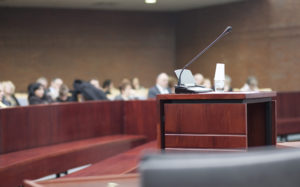
The Department of Education publishes proposed rule amending Title IX regulations, EPA Acting Administrator rejects skepticism of man-made climate change, and more…
IN THE NEWS
- The U.S. Department of Education published a proposed rule that would amend regulations under Title IX, the statute that prohibits sex discrimination at federally funded schools and education programs. The Education Department stated the new rule would “set forth clear standards” defining sexual harassment, and that it would “treat complainants and respondents equally” during investigations and adjudications. U.S. Senator Patty Murray (D-Wash.) implored the Education Department to withdraw its proposal, saying the rule would weaken protections for victims of campus sexual assault. Public comments will be accepted until January 28, 2019.
- Acting U.S. Environmental Protection Agency Administrator Andrew Wheeler rejected President Donald J. Trump’s skepticism of man-made climate change. “I believe that man does have an impact on the climate,” Wheeler said. But he agreed with President Trump’s criticism of a report issued by the U.S. Global Change Research Program last Friday that recommended action to reduce greenhouse gas emissions. The scenarios in the report “downplay innovation” and do not sufficiently credit emissions reductions in the United States, Wheeler said.
- A bipartisan group of U.S. Representatives introduced the Energy Innovation and Carbon Dividend Act, a bill that would establish a tax on carbon dioxide emissions. The act would require companies to pay taxes based on expected emissions from fossil fuel production, and then the U.S. Department of the Treasury would redistribute the money to the public. Representative Brian Fitzpatrick (R-Pa.), one of the bill’s co-sponsors, emphasized the need for a “bipartisan, market-driven approach to reduce carbon emissions” and to “preserve our environment.”
- The U.S. Department of Justice filed a notice of its intent to appeal a temporary restraining order preventing the denial of asylum to certain immigrants. The Justice Department reportedly claimed that the order “undermines the Executive Branch’s efforts” to encourage immigrants entering from Mexico “to simply follow our laws.”
- The New York Court of Appeals ruled 5-2 that non-citizens are entitled to a jury trial under the Sixth Amendment of the U.S. Constitution if they are charged with crimes that carry the “potential penalty for deportation.” Judge Leslie E. Stein wrote that, although charges of “petty” crimes generally do not trigger a person’s Sixth Amendment right to a jury trial, defendants are nonetheless entitled to one if they could face deportation as the “maximum potential penalty” for the “petty” crime with which they were charged. In dissent, Judge Michael J. Garcia expressed doubt that the U.S. Supreme Court intended to “import” federal immigration law into the Sixth Amendment right to a jury trial in “serious” offenses.
- Chinese scientist Jiankui He claimed that he successfully edited the genes of human twins to make them HIV-resistant, provoking widespread concern among scientists and the general public. Vice director of China’s National Health Commission (NHC), Yixin Zeng, reportedly stated that the experiment was an unethical violation of Chinese laws and regulations. NHC and other Chinese authorities “demanded” an investigation into He’s claim and ordered a halt to his research activities.
- Germany’s competition authority, the Bundeskartellamt, announced that it began an investigation into whether Amazon has abused its market power to disadvantage sellers on its online marketplace. The potentially “abusive” business practices Bundeskartellamt will look into include alleged withholding of payment to sellers and blocking of seller accounts by Amazon. The company’s “double role as the largest retailer and largest marketplace has the potential to hinder other sellers on its platform,” Bundeskartellamt President Andreas Mundt said.
- Representatives from the United Kingdom, Argentina, Belgium, Brazil, Canada, France, Ireland, Latvia, and Singapore met at the House of Commons in London for a hearing on policy solutions to disinformation and fake news. Representatives signed a declaration that “a system of global internet governance” should be created to protect citizens from “campaigns of disinformation launched from one country against citizens in another.” Facebook CEO Mark Zuckerberg declined an invitation to attend the hearing, instead sending the company’s vice president of policy solutions in Europe, Richard Allan.
- The Los Angeles City Council unanimously approved an ordinance to establish a sidewalk vending program, beginning the process of legitimizing sidewalk entrepreneurs throughout the city. The city will require all vendors to possess permits by 2020. City councilman Curren D. Price, Jr. (D), who supported the ordinance, reportedly stated that permitting details will be determined in the next year with input from advocacy and community groups.
WHAT WE’RE READING THIS WEEK
- Air taxis and other future aircraft intended to carry passengers over shorter distances for affordable prices will require a new regulatory structure, wrote Brent Skorup of the Mercatus Center at George Mason University in a working paper. Skorup observed that the current air traffic control system is “overwhelmed,” and if air taxis become widespread, the system may be unable to deal with increased traffic at lower altitudes. He instead proposed that the Federal Aviation Administration “delimit geographic tracts of low-altitude airspace” and auction off exclusive rights to operate over each tract for a set amount of time.
- In a recent paper, Arnav Joshi of The London School of Economics examined regulatory approaches to the sharing economy. Joshi described sharing platforms as “digital infrastructure” that can produce “real, tangible contributions” to society, but pose challenges to policymakers who lack information about their inner workings. Joshi argued that regulations should draw from laws governing consumer protection, data protection, and traditional infrastructure to address the novel challenges posed by the digital sharing economy.
- In a recent working paper, Florian Martin-Bariteau of the University of Ottawa Faculty of Law argued that it is unclear how the European Union’s (EU) General Data Protection Regulation (GDPR) applies to the handling of personal data on a blockchain. He noted that the French data protection authority has said that the GDPR applies to certain actors who handle personal data on a blockchain, but the Hungarian data protection authority argued that the GDPR may not apply to data handling that occurs in non-EU countries.



